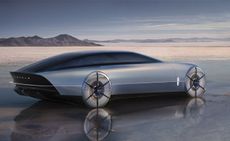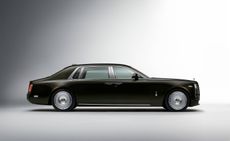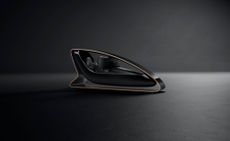Will this UK company secure the future of classic cars?
Everrati, a specialist UK engineering firm hailing from the rolling hills of the Cotswolds in the UK, thinks it holds the key to classic car electrification
- (opens in new tab)
- (opens in new tab)
- (opens in new tab)
- Sign up to our newsletter Newsletter

The steep value curve of classic cars – even the most seemingly mundane example – suggests that by the time petrol is seriously scarce, most machines that still run it will be almost too valuable to use on a daily basis.
Justin Lunny runs Everrati, formerly Ionic, a specialist UK engineering firm based in the Cotswolds. After selling his Fintech firm Lunny was casting around for a business that combined automotive and technology. ‘When I saw Jaguar’s electric E-Type being used at Harry and Meghan’s wedding, I realised there was something there,’ he says. ‘Very few companies are doing this in the right way.’

The Everrati Porsche is re-engineered for electric power
The future is electric
And so Everatti was born, a company designed to take much-loved existing classics and transform them into sporty EVs for everyday use far, far into the future. From the outset, Lunny and his team realised that this was a high-end proposition. Instead of simply ‘splicing existing EV parts’ into a classic car with ‘dubious engineering,’ an Everrati is designed from the ground up. ‘Our intention is to take a vehicle and subtly transform it from a combustion engine to an EV,’ he says, ‘we’re essentially completely re-engineering them. We 3D scan the vehicle to assess where the weight of the batteries should be placed. Then we custom design the new parts to fit into the areas where engine, fuel tank, etc., would have been.’

As well as re-engineering the 964 version of Porsche's 911 for electric power, Everrati undertake a complete restoration of your car
Everrati’s flagship is currently a complete transformation of Porsche’s 964-series 911, a car that was originally built between 1989 and 1994. Over 63,000 were built and there are plenty of owners, old and new, who like the idea of giving their car a new lease of life. ‘With the Porsche, we can put a lot of power into it because we know the car can take it,’ Lunny explains, ‘for the Land-Rover and Mercedes models we do, the performance is much sedate.’ Any electric vehicle, whether new or retro-fitted, has to balance the equation of weight, range and performance, and Everrati is no different.

The interior of Everrati's all-electric 911
Effectively, the company is offering a restoration service with a difference. ‘It’s about keeping the original feel of the cars as much as possible,’ Lunny says, ‘the interiors are just as important as the rest of the car. We strip everything back to the chassis and recondition it. The Porsche actually ends up lighter than the original car because we use carbon fibre panels.’ The process also includes upgrading suspension where needed, as well as adding regenerative braking to charge the battery kinetically. ‘Our customers determine whether a car has cachet or value and these judgements depend on their age. In a way, it’s easier to do these changes to an older car but we’re set up to deal with more modern vehicles as well.’

The interior of Everrati's all-electric 911
While Everrati stresses it can tackle practically anything, the systems for adapting the Porsche and the Land-Rover have been fully productionised. ‘Then it’s down to customer specification, and whether they want specific trim changes for example.’ Asked if his firm would transform a particularly rare car, Lunny is evasive. ‘If it was a very low mileage important car, we probably wouldn’t take on the job. You have to ask, does the end result justify the price?’ Some customers have asked for the oily innards of the original car to be preserved as an objet d’art, acknowledging that such engineering is often be extremely beautiful.

The Superformance GT40 is the next model to be electrified
The company has also announced a new partnership with Superformance, a manufacturer of continuation models of Ford’s 1960s era super sports car, the GT40. Development is underway for an electrified version of this iconic model, which both companies acknowledge as a nod to the Anglo American partnership that developed the original GT40 back in the 1960s.

Everrati's electric Porsche 911 alongside the Superformance GT40
The switch to electric mobility has many upsides, but a vocal minority of enthusiasts are finding the inevitable slow death of the internal combustion engine hard to take. With well over a century of automotive history seemingly condemned to a long, lingering extinction, is there any hope for the traditional classic car? Outside of museums, concours events and car shows, companies like Everatti are providing a second life for totemic designs that might overwise vanish from our roads. Although Lunny stresses that the whole process is reversible, he believes his approach ensures older cars stay relevant, used and well-loved. ‘It appeals to those people who might not have owned a classic before and who don’t want the hassle of breakdowns and servicing,’ he says. ‘Countries like France are looking into the benefits of doing this to older mass-market cars, so I think the process will definitely come down in cost.’ For now, Everrati’s Porsche, Land-Rover and Mercedes convertible, are a fascinating alternative to the mainstream.
INFORMATION
Porsche (964) 911, from £250,000
everrati.com (opens in new tab)
Jonathan Bell has written for Wallpaper* magazine since 1999, covering everything from architecture and transport design to books, tech and graphic design. He is now the magazine’s Transport and Technology Editor. Jonathan has written and edited 15 books, including Concept Car Design, 21st Century House, and The New Modern House. He is also the host of Wallpaper’s first podcast.
-
 Remembering New York artist Daniel Brush, 1947 – 2022
Remembering New York artist Daniel Brush, 1947 – 2022In tribute to Daniel Brush, who has died aged 75, we revisit this 2020 Wallpaper* profile of the elusive New York artist by jewellery historian Vivienne Becker, who unravelled the secrets of his singular designs for her book, ‘Daniel Brush: Jewels Sculpture’
By Vivienne Becker • Published
-
 Interior design books championing shelf love
Interior design books championing shelf loveWelcome to the Wallpaper* guide of the best interior design books published in 2022 and beyond – a collection of riveting visual tomes to feed creative innovation, inspiration and imagination
By Rosa Bertoli • Published
-
 Christmas decorations from leading creatives and design brands
Christmas decorations from leading creatives and design brandsOur edit of contemporary Christmas decorations ranges from architect-designed festive ornaments to Christmas baubles by leading creatives
By Rosa Bertoli • Published
-
 Peugeot’s sparky 308 gets hybrid power and handsome lines
Peugeot’s sparky 308 gets hybrid power and handsome linesThe Peugeot 308 proves that mass-market design needn’t be dull, blending hybrid power with sharp lines and excellent detailing
By Jonathan Bell • Last updated
-
 BMW Motorrad brings out the big guns for its newest cruisers
BMW Motorrad brings out the big guns for its newest cruisersBMW Motorrad R 18 Bagger and Transcontinental set the tone for high-voltage cruising with a brand collaboration with speaker specialist Marshall
By George Chapman • Last updated
-
 Dacia’s new Manifesto concept is a true outdoor utility vehicle
Dacia’s new Manifesto concept is a true outdoor utility vehicleUtilitarian auto brand Dacia sets a bold new agenda with its Manifesto, a concept car pitched at the active outdoor market
By Jonathan Bell • Last updated
-
 The sun sets on traditional supercars at California’s Monterey Car Week
The sun sets on traditional supercars at California’s Monterey Car WeekMonterey Car Week, the world’s most prestigious car gathering, is showcasing ever-more extravagant special editions, coachbuilt cars and all-new electric concepts. Here are seven key machines from 2022
By Rory FH Smith • Last updated
-
 Is McLaren’s GT a sports car, a tourer, or the best of both?
Is McLaren’s GT a sports car, a tourer, or the best of both?The McLaren GT is a capable all-rounder dressed up in svelte supercar clothes. It might also be the last of its type
By Jonathan Bell • Last updated
-
 Rolls-Royce puts the Phantom back on its lofty pedestal
Rolls-Royce puts the Phantom back on its lofty pedestalA mid-life refresh ensures the flagship Rolls-Royce Phantom Series II is at the top of its game, a last hurrah for traditional engines before an electrified future
By Jonathan Bell • Last updated
-
 Prodrive’s new racing simulator is shaped by Callum to be front of the grid
Prodrive’s new racing simulator is shaped by Callum to be front of the gridThe racing simulator shapes up – this new design from Prodrive and Callum is honed for the high-end games room
By Jonathan Bell • Last updated
-
 The Cupra Formentor is a dark star for bright minds
The Cupra Formentor is a dark star for bright mindsFor all its moody styling, the Cupra Formentor – from the SEAT spin-off brand – is a compact, swift and fun-to-drive crossover
By Jonathan Bell • Last updated










